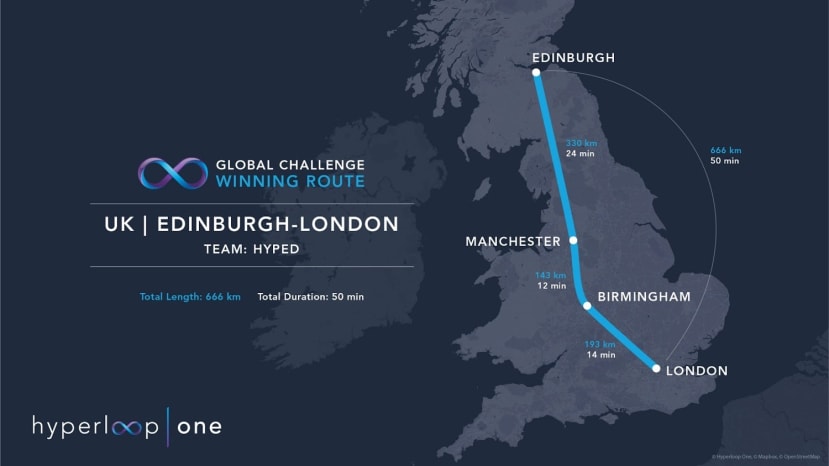Making Hyperloop a Reality
Follow articleHow do you feel about this article? Help us to provide better content for you.
Thank you! Your feedback has been received.
There was a problem submitting your feedback, please try again later.
What do you think of this article?
Hyperloop is a new mass-transportation system proposed by Elon Musk. It is designed to carry passengers or cargo in autonomous pods at speeds of up to 1100km/h via tubes in which the air pressure is reduced to a near vacuum to minimise air drag. The pods are electrically propelled and utilise magnetic levitation to eliminate rolling friction. These measures mean that the pods should be able to reach speeds greater than an aircraft and reduce journey times between cities from hours to minutes.
HYPED's UK route could connect the Scottish central belt to London in only 50 minutes
Elon Musk developed the initial concept in his Hyperloop Alpha paper in 2013. Over the past 5 years, hyperloop has garnered global interest and investment. A number of venture-capital-backed companies such as Virgin-Hyperloop One, HTT and Transpod have since formed to develop and commercialise the technology. Governments around the world have taken note; feasibility studies and test tracks for hyperloop technology are under development in a number of countries such as India, China, France, Netherlands, UAE and the USA. Increasingly, universities and research bodies are also starting to show interest in researching the technology and the economic impacts it could have on society.
Who are HYPED?
HYPED is a student-led project formed in 2015 at the University of Edinburgh to accelerate the development of hyperloop technology. HYPED’s work covers R&D into both the technical and commercial aspects of Hyperloop.
To date, HYPED has taken part three times in Elon Musk’s annual SpaceX Hyperloop Pod competition, where students design, build and test prototype hyperloop pods in the SpaceX test tube in California. The most recent round took place on July 22, 2018, where HYPED was the only team to demonstrate a Hyperloop prototype pod with a working magnetic levitation and propulsion system, placing us 6th in the world.
The HYPED team with Poddy II at SpaceX Competition finals, 2018
HYPED also entered the Hyperloop One Global Challenge in 2016 where entrants propose potential hyperloop routes and analyse their impacts. Over 2,600 entrants took part, including leading engineering consultancies such as AECOM and Arup. HYPED’s proposed UK hyperloop route connecting Edinburgh to London (via Manchester and Birmingham) in 50 minutes was announced as one of the 10 winners of the competition.
The case HYPED put forward highlighted the significant benefits that a hyperloop system could bring to the UK; much faster, more reliable transport links will always benefit cities, but the significantly higher speeds involved in hyperloop compared with existing transport modes could also stimulate new housing, jobs and improvements in productivity, and ultimately help rebalance regional inequalities and create new industrial opportunities.
HYPED focuses on technical, commercial, and STEM outreach efforts surrounding Hyperloop
What’s next for HYPED?
At HYPED, we see hyperloop as a future competitor to rail and short haul flights. The first generation of hyperloop technology should cater for journeys of approximately 50 to 1300 km, and the costs of building hyperloop infrastructure between cities should be comparable to airport expansion and heavy rail infrastructure.
Airport expansion is a case that HYPED has looked at in some detail but plans to explore further. For example, a hyperloop system that connects Heathrow and Gatwick, the UK’s major airport hubs, would effectively create one large airport which passengers could rapidly transfer between, with journey times comparable to inter-terminal shuttles. This would combat the need for airports to expand using adjacent land, allowing airports to add capacity off-site to cater for additional demand. Integrating hyperloop into the airport infrastructure is, therefore, a promising area for future research.
Some of the key technical challenges HYPED sees in delivering hyperloop systems successively are maintaining the near-vacuum environment inside the tube, construction including tunnelling if necessary, and building the digital infrastructure and systems to control, monitor and maintain a hyperloop network. On the commercial side, HYPED plans to dedicate its research efforts towards better understanding the best models and frameworks for regulations, financing and ways of integrating hyperloop systems with consumer-facing transport solutions such as mobility as a service (MaaS).
In the autumn, HYPED will publish a Hyperloop Beta paper, summarising efforts to develop and test hyperloop technology over the last 5 years since Musk’s original Hyperloop Alpha paper. The paper will detail the changes to Musk’s original vision, new challenges identified, and offer potential solutions. This work is supported by a number of key industry stakeholders and will be released to add to the existing evidence base on hyperloop and spur industry to join the effort to develop the technology. The paper coincides with some of our members spinning out a company from HYPED to work directly in the hyperloop industry, and we look forward to working closely with them and supporting their future efforts.
At HYPED, we believe that the potential benefits of hyperloop resonate with the wider public; the idea of being able to reach most UK cities from anywhere within an hour opens up a world of opportunity. We will continue to work hard as part of the global efforts to make Hyperloop a reality.
Facebook: https://www.facebook.com/hypedinburgh
Website: http://hyp-ed.com/
Author: Jack Noble




